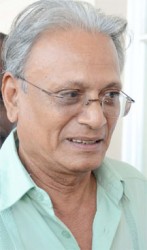APNU Executive Member Dr Rupert Roopnaraine says that he does not believe that the presidential term limit set out in the constitution leaves any room for a former president to contest again after serving two terms.
“I believe re-election means what it says; it means elections again, it doesn’t mean anything else,” Roopnaraine, a constitutional expert, told Stabroek News in wake of a suggestion that the omission of the word “consecutive” from the term-limit provision inserted into Guyana’s constitution in 1999 allowed for something which, among other things, various stakeholders worked to change.
Article 90 (2) of Guyana’s constitution reads: “A Person elected as President after 2000 is eligible for re-election only once.”
However, in his November 24, Sunday Stabroek column, former Speaker Ralph Ramkarran, SC, wrote that the absence of the word “consecutive” from the provision has sparked speculation that a president may be allowed to serve only one term or two consecutive terms and return after a lapse of one or more terms and seek the presidency through elections once more.
Ramkarran had noted that there has been much speculation about the future of former President Bharrat Jagdeo, who has served two successive terms as head of state. He recalled that it started while Jagdeo’s second term was coming to an end as supporters publicly expressed support for a third presidential term. He noted that speculation about a third presidential term has been renewed once more because many supporters of the PPP believe that his candidacy will restore an absolute majority for the PPP/C.

However, during the Constitution Reform Process, it was recommended that a limit be placed on the amount of terms a president should be allowed to serve. In his book, “An Annotated Handbook of the 17 July 1999 Report of the Constitution Reform Commission, Guyana,” Haslyn Parris, who served as Secretary to the National Assembly’s Oversight Committee that oversaw the drafting of the reforms, recorded several of the recommendations of the stakeholders on the term limit.
Submission #216 (f) (3), which was made by the Peoples National Congress (PNC), reads: “A president should be limited to two successive terms, after which he should be ineligible for the presidency again, until a period of ten years has elapsed from the end of his term.”
The Private Sector Commission (PSC) in its recommendation said that “the President should be limited to two consecutive terms,” while the submission by the People’s Progressive Party (PPP) stated that “a person elected to the office if the President should not hold the said office for more than two terms.”
Parris himself, when asked his opinion on Ramkarran’s arguments, said that he did not know what to make of the arguments, especially in light of what is recorded in the Commission’s records.
Reflecting these proposals, Ramkarran said the Constitution Reform Commission’s Report on the submissions read: “Many submissions proposed that a President should be limited to two terms in office.” As such, in finalising the recommendations for the constitutional amendment in this regard, the Commission said: “A person shall hold the office of the President for a maximum of two (2) terms and those terms shall be consecutive.”
But Ramkarran suggests that the fact that the word “consecutively” is not part of the constitutional provision allows exactly what the recommendations sought to prevent. He contends that the speculation that has arisen turns on the interpretation of the word “re-election.”
“Since a re-election can only come immediately after an “election,” therefore “re-election” means “re-election” to a second consecutive term. A “re-election” cannot come after a lapse of one or more terms because that would be an “election.” Since a President can only be “re-elected” only once, it means that he can only serve two consecutive terms at one time,” Ramkarran argues.
Ultimately, he purports that the constitution does not preclude “a President being “elected” again after a lapse of one or more terms as this would be an “election” and not a “re-election.”
Roopnaraine, who served as a member of the Oversight Committee, says that the intention of the Committee was to bar any president from serving more than two consecutive terms and that the recommendation which eventually became a provision in the constitution speaks to that intention. “My reading of the constitution does not accord with his (Ramkarran),” Roopnaraine told Stabroek News in an interview, while adding, “I do not believe that the word re-election can be limited to instances where we’re talking about consecutive elections. I believe re-election means what it says, it means elections again, it doesn’t mean anything else.”
He noted that the word “consecutive” was not in the vocabulary of the recommendations but he said that the provision was written just the way the members of the Committee wanted it to be written.
Ultimately, he believes that the spirit of the Committee in 1999 was to bar any president from having more than two consecutive terms in office and says that to interpret the constitution in any other way would be a violation of that spirit.
Nevertheless, Ramkarran maintains that the wording of the constitution on this matter leaves the door for an interpretation which is not consistent with the intentions of the 1999 Committee.
If such a challenge is ever made—and Ramkarran suggests that this is possible—it will be left to the judiciary, as the constitution’s arbiter, to decide upon its meaning.
Already, the main opposition party APNU has said that it is against any interpretation of the constitution that would avail any past president more than two consecutive terms in office. When contacted yesterday, Government Whip and presidential adviser Gail Teixeira was unable to give the government’s view on the issue, although she did say that it was not as serious an issue as it was being made to seem.
Attempts were made to contact AFC MP Moses Nagamootoo, who had represented the PPP on the Oversight Committee in 1999 and PPP/C MP Manzoor Nadir, who had represented The United Force, but to no avail.









